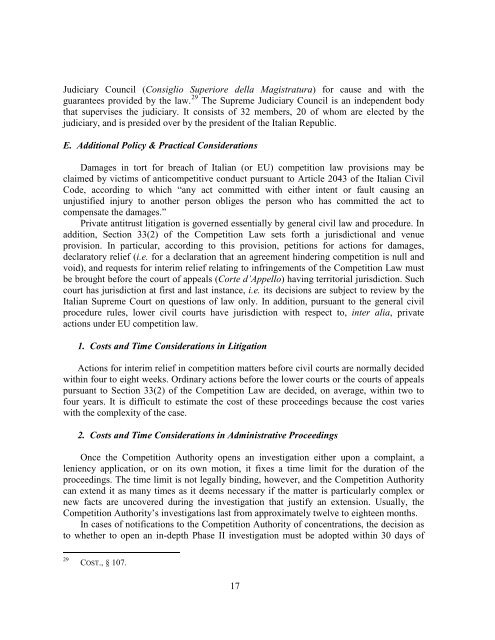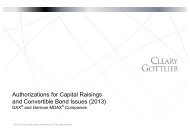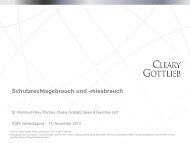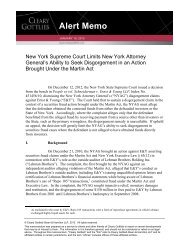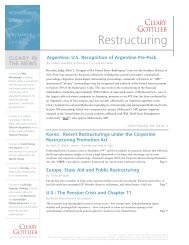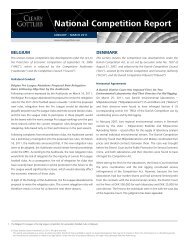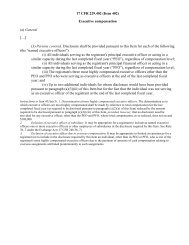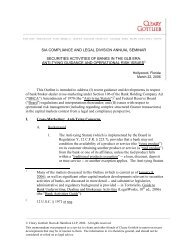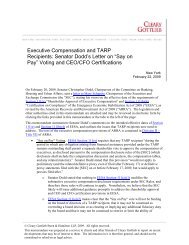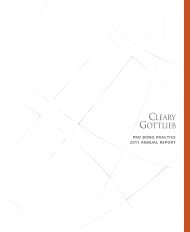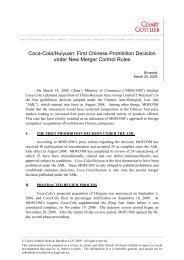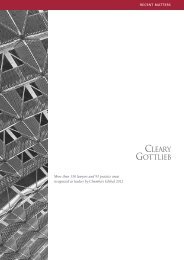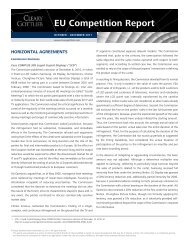Competition Law in Italy The first 20 years of law and practice
Competition Law in Italy The first 20 years of law and practice
Competition Law in Italy The first 20 years of law and practice
You also want an ePaper? Increase the reach of your titles
YUMPU automatically turns print PDFs into web optimized ePapers that Google loves.
Judiciary Council (Consiglio Superiore della Magistratura) for cause <strong>and</strong> with the<br />
guarantees provided by the <strong>law</strong>. 29<br />
<strong>The</strong> Supreme Judiciary Council is an <strong>in</strong>dependent body<br />
that supervises the judiciary. It consists <strong>of</strong> 32 members, <strong>20</strong> <strong>of</strong> whom are elected by the<br />
judiciary, <strong>and</strong> is presided over by the president <strong>of</strong> the Italian Republic.<br />
E. Additional Policy & Practical Considerations<br />
Damages <strong>in</strong> tort for breach <strong>of</strong> Italian (or EU) competition <strong>law</strong> provisions may be<br />
claimed by victims <strong>of</strong> anticompetitive conduct pursuant to Article <strong>20</strong>43 <strong>of</strong> the Italian Civil<br />
Code, accord<strong>in</strong>g to which “any act committed with either <strong>in</strong>tent or fault caus<strong>in</strong>g an<br />
unjustified <strong>in</strong>jury to another person obliges the person who has committed the act to<br />
compensate the damages.”<br />
Private antitrust litigation is governed essentially by general civil <strong>law</strong> <strong>and</strong> procedure. In<br />
addition, Section 33(2) <strong>of</strong> the <strong>Competition</strong> <strong>Law</strong> sets forth a jurisdictional <strong>and</strong> venue<br />
provision. In particular, accord<strong>in</strong>g to this provision, petitions for actions for damages,<br />
declaratory relief (i.e. for a declaration that an agreement h<strong>in</strong>der<strong>in</strong>g competition is null <strong>and</strong><br />
void), <strong>and</strong> requests for <strong>in</strong>terim relief relat<strong>in</strong>g to <strong>in</strong>fr<strong>in</strong>gements <strong>of</strong> the <strong>Competition</strong> <strong>Law</strong> must<br />
be brought before the court <strong>of</strong> appeals (Corte d’Appello) hav<strong>in</strong>g territorial jurisdiction. Such<br />
court has jurisdiction at <strong>first</strong> <strong>and</strong> last <strong>in</strong>stance, i.e. its decisions are subject to review by the<br />
Italian Supreme Court on questions <strong>of</strong> <strong>law</strong> only. In addition, pursuant to the general civil<br />
procedure rules, lower civil courts have jurisdiction with respect to, <strong>in</strong>ter alia, private<br />
actions under EU competition <strong>law</strong>.<br />
1. Costs <strong>and</strong> Time Considerations <strong>in</strong> Litigation<br />
Actions for <strong>in</strong>terim relief <strong>in</strong> competition matters before civil courts are normally decided<br />
with<strong>in</strong> four to eight weeks. Ord<strong>in</strong>ary actions before the lower courts or the courts <strong>of</strong> appeals<br />
pursuant to Section 33(2) <strong>of</strong> the <strong>Competition</strong> <strong>Law</strong> are decided, on average, with<strong>in</strong> two to<br />
four <strong>years</strong>. It is difficult to estimate the cost <strong>of</strong> these proceed<strong>in</strong>gs because the cost varies<br />
with the complexity <strong>of</strong> the case.<br />
2. Costs <strong>and</strong> Time Considerations <strong>in</strong> Adm<strong>in</strong>istrative Proceed<strong>in</strong>gs<br />
Once the <strong>Competition</strong> Authority opens an <strong>in</strong>vestigation either upon a compla<strong>in</strong>t, a<br />
leniency application, or on its own motion, it fixes a time limit for the duration <strong>of</strong> the<br />
proceed<strong>in</strong>gs. <strong>The</strong> time limit is not legally b<strong>in</strong>d<strong>in</strong>g, however, <strong>and</strong> the <strong>Competition</strong> Authority<br />
can extend it as many times as it deems necessary if the matter is particularly complex or<br />
new facts are uncovered dur<strong>in</strong>g the <strong>in</strong>vestigation that justify an extension. Usually, the<br />
<strong>Competition</strong> Authority’s <strong>in</strong>vestigations last from approximately twelve to eighteen months.<br />
In cases <strong>of</strong> notifications to the <strong>Competition</strong> Authority <strong>of</strong> concentrations, the decision as<br />
to whether to open an <strong>in</strong>-depth Phase II <strong>in</strong>vestigation must be adopted with<strong>in</strong> 30 days <strong>of</strong><br />
29 COST., § 107.<br />
17


